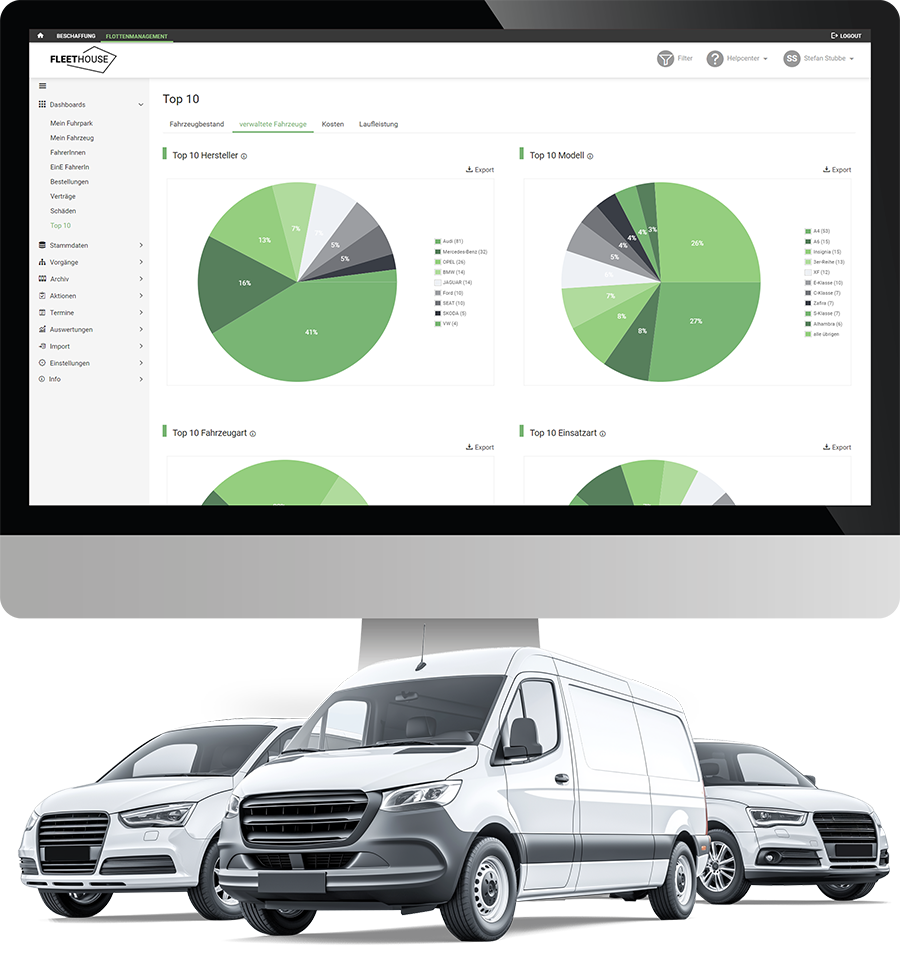In today’s economy, mobility is a decisive factor for the success of a company. An effective, flexible and cost-efficient mobility strategy is therefore essential. Corporate leasing offers companies an excellent opportunity to achieve these goals. In this blog post, we take a look at the concept of corporate leasing, discuss the benefits and look at the most important aspects
Contents
What is corporate leasing?
Corporate leasing, also known as business leasing or business leasing, refers to an arrangement where a company leases an asset open_in_new such as vehicles from a lessor, usually for an extended period of time.
Under a corporate lease, the company pays a regular rental fee to the lessor in order to use the asset. This fee can be paid monthly, quarterly or annually and can include various costs such as maintenance, insurance and other services. Which expenses are covered by the lease payment depends on the terms of the lease agreement.
Unlike purchasing, corporate leasing allows companies to use the assets they need without having to invest large amounts of capital upfront. This can be particularly advantageous if the company wants to maintain its liquidity or if it regularly needs new equipment.
Corporate leasing enables the use of required assets without large capital investments in advance.
Company leasing - Who can drive?
A key advantage of corporate leasing is the flexibility in user selection. In general, the leasing contract define who is authorized to use the leased assets. In the case of vehicles, the authorized drivers for company leasing are usually specified in the contract.
However, the exact provisions may vary depending on the lessor and the individual contract. It is important that all drivers named in the contract meet the relevant insurance requirements and have a permit or authorization if applicable.
It is advisable to check the leasing contract carefully and to consult the lessor or the relevant legal advice in the event of ambiguities or specific questions to ensure that all provisions and requirements are comprehensible.

When is business leasing an option?
Companies of all sizes can benefit from business leasing. The ideal time to enter into business leasing depends on various factors, such as the company’s current financial situation, the need for company car leasing and the strategic planning of operational mobility. In general, business leasing is interesting from the moment a company realizes that the flexibility and cost efficiency of leased vehicles add value to its business operations.
What documents are required for business leasing?
For business leasing, various documents are required to complete the leasing process. The exact requirements may vary depending on the lessor and the type of leasing transaction. As a rule, the following documents are required:
Company documents:
- Commercial register excerpt or business registration to prove the existence and legal structure of the company
- Copy of business documents such as articles of incorporation or bylaws to confirm the authority to enter into the lease agreement
Financial documents:
- Balance sheets and profit and loss accounts for recent financial years to demonstrate the financial stability of the company
- Credit check or credit rating to assess the company’s financial ability to pay the lease installments Bank statements or other financial evidence to confirm the company’s liquidity
Vehicle or asset-related documents:
- Information about the vehicle to be leased, such as model, equipment and, if applicable, serial number, vehicle documents such as vehicle registration document and registration certificate for vehicle leasing.
Insurance documents:
- Confirmation of sufficient insurance cover for the vehicle or asset to be leased in accordance with the lessor’s requirements.
It is important to contact the lessor at an early stage to clarify the exact documents and requirements needed for business leasing. Companies can make the business leasing process smoother and shorten processing times if all the necessary documents are submitted on time and in full.

New vehicle at the click of a mouse?
Choose the right company car for your fleet from the wide range of leasing offers available immediately.
Company leasing - What to consider?
To get the most out of corporate leasing, companies should consider the following points:
Clear contract terms: Make sure you have transparent and understandable company leasing conditions. This includes the term, mileage limit and conditions for early termination of the contract. More on the topic of excess mileage in leasing in our blog post: “Excess mileage leasing: how to avoid additional payments“.
Understand the total cost: Consider not only the monthly lease payment, but also all additional costs, such as service fees, insurance and possible penalties for exceeding the mileage or for damage to the vehicle.
Define terms of use: Specify who may use the vehicles and under what conditions. If private use is permitted, clarify how this is regulated and billed. All specifications should be recorded in a car policy.
Check insurance cover: Ensure that appropriate insurance cover is in place for the vehicles, covering both the lessor’s requirements and the needs of your business.
The advantages of corporate leasing
Corporate leasing offers companies numerous advantages:
- Cost efficiency: One of the biggest advantages of company leasing is the cost savings. Companies do not have to pay the full amount for the purchase of a vehicle. This means that they can keep their capital free for other investments. In addition, the leasing rates are usually lower than the rates of a vehicle loan.
- Budget planning: With fixed monthly leasing rates, companies can plan their expenses better and manage their budget more efficiently. This contributes to more stable financial planning.
- Tax advantages: In Germany, leasing installments can be deducted from tax as business expenses, resulting in potential tax benefits.
- Flexibility and adaptability: Corporate leasing offers flexibility in terms of term, mileage and contract conditions. Companies can adapt their vehicle fleet as required, which is particularly advantageous in rapidly changing markets.
- Access to the latest models: Corporate leasing gives companies access to the latest vehicle models with advanced technology and greater energy efficiency, allowing them to regularly renew their vehicle fleet.
Car subscription module
Subscribe to the next company vehicle with Fleethouse. Together with FINN, we offer you an all-round carefree mobility package.
Tips for successful corporate leasing
To get the most out of your company leasing, you should consider the following tips:
Analyze your needs: Before deciding on corporate leasing, it is important to analyze your business mobility needs in detail. Our leasing guide can help you find the right leasing contract.
Compare offers: Take your time to compare company leasing offers. Don’t just consider the costs, but also the services and conditions. You can find valuable tips for commercial leasing in your fleet in our company car leasing blog post.
Watch out for additional costs: Be aware of possible hidden costs in the company leasing contract. Our leasing return checklist will help you avoid surprises at the end of the term and inform you about what to do in the event of damage.
The most important facts about corporate leasing at a glance
Companies of all sizes can benefit from corporate leasing.
Thanks to company leasing, companies can make use of company cars without having to make large capital investments.
Make sure that the conditions for company leasing are transparent and easy to understand.
Arrange an online consultation appointment
Arrange your personal consultation appointment now. You can easily select a suitable appointment using our booking tool.
Further Fleet Knowledge
If you liked this article and would like to know more about this topic, we recommend these articles.


Leasing returns: advantages for the company fleet



